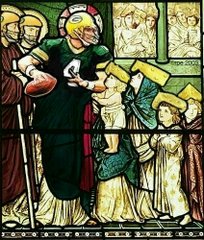SEPTUAGESIMA
HE APOLOGY OF THE AUGSBURG CONFESSION
ARTICLE V: LOVE and FULFILLING the LAW
241] We are not trying to start a needless word battle about the term reward. But this is a great, exalted, and very important matter about where Christian hearts can find true and certain comfort. It is about whether our works can give consciences rest and peace, again, whether we are to believe that our works are worthy of eternal life, or whether that is given to us for Christ's sake. These are the real questions regarding these matters. If consciences are not rightly taught about these, they can have no certain comfort. However, we have stated clearly enough that good works do not fulfill the Law, that we need God’s mercy, that through faith we are accepted by God, that good works--be they ever so precious, even if they were the works of St. Paul himself--cannot bring rest to the conscience. It makes sense that we are to believe that we receive eternal life through Christ by faith, not because of our works or of the Law. But what do we say of the reward that Scripture mentions? If the adversaries will admit that we are regarded righteous through faith because of Christ, and that good works please God because of faith, we will not afterward argue much about the term reward. We confess that eternal life is a reward; it is something due because of the promise, not because of our merits. For the justification has been promised, which we have previously shown to be properly God’s gift. To this gift the promise of eternal life has been added, according to Romans 8:30, “Those whom He justified He also glorified.” 242] Here belongs what Paul says, “There is laid up for me the crown of righteousness, which the Lord, the righteous judge, will award to me” )2 Timothy 4:8). The justified are due the crown because of the promise. 243] Saints should know this promise, not that they may labor for their own profit, for they ought to labor for God’s glory. But saints should know it so they may not despair in troubles. They should know God's will: He desires to aid, to deliver, and to protect them. Although the perfect hear the mention of penalties and rewards in one way, the weak hear it in another way. The weak labor for the sake of their own advantage.
Condensed quotations from the Lutheran Confessions from Concordia: The Lutheran Confessions, copyright 2005, 2006 by Concordia Publishing House. Used by permission. All rights reserved.







No comments:
Post a Comment